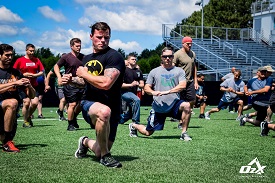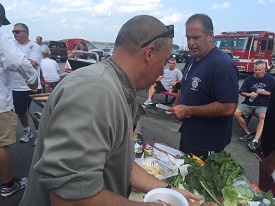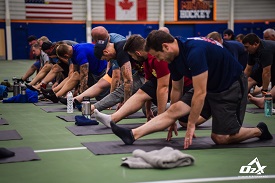
By Russell Osgood
Have you been doing all you can to protect yourself against cancer? I am pleased when I see the brothers and sisters who have adopted the best practices for cancer prevention in action. Many departments are embracing gross decon as a way to mitigate the exposures directly following a fire. Good air management and extended use of self-contained breathing apparatus (SCBA) today has firefighters doing the right thing by donning their masks outside and away from the hazard area as well as wearing the SCBA throughout overhaul. When leaving the scene, the brothers and sisters are taking care of their equipment and bodies by washing off the toxicants. These are enormous steps in the right direction in our fight against cancer. I am sure that these practices on the fireground will have a great impact on the statistics going forward, but what are you doing in your everyday life outside the fire service to reduce risks?

“O2X Specialist Dr. Maria Urso talks about the importance of ‘Feet, Forks, and Fingers’ in her presentations nationwide.”
(Photos courtesy of O2X Human Performance.)
Let’s look at a few areas where simple changes will lessen the overall risk of cancer. Given the fact that there are some exposures we cannot avoid, we should take every opportunity to reduce risk where we can, both on and off the job.
RELATED VIDEO
FDIC WORKSHOP VIDEO: Russell Osgood Takes on Fire Service Cancer
RELATED ARTICLES
Firefighter Cancer Prevention: Using the Tools Provided to Us
Hard Hat Inventor Bullard Donates to Firefighter Cancer Support Network
Pharmaceutical Health vs. Real Fitness
Smoking
I would be remiss if I didn’t start with the obvious, that is smoking or tobacco use in any form. This should be a thing of the past. As my friend Dr. Michael Hamrock, a former Boston firefighter and a Boston Fire physician says, “If you smoke, you are buying yourself a trip to the cancer ward.” Tobacco use is the worst contributing factor to cancer.1 Although it seems that firefighters are smoking less than they once did, I have noticed that firefighters are chewing tobacco often. If you smoke or chew, quit today. You will effectively reduce your risk of dying from a tobacco-related disease by 90 percent.[1]
Diet
Our diet plays a large role in our overall health, and some foods we choose to eat can contribute to our cancer risk. The World Cancer Research Fund and the American Institute for Cancer Research have been studying the link between diet and cancer for many years through the Continuous Update Project,[2] the world’s largest, most authoritative, and up-to-date source of scientific research on cancer prevention and survivorship through diet, nutrition, and physical activity.
I wonder if you have ever added up the caloric value of that hearty firehouse meal. Family-style meals are really great, and they are an important part of bonding with the folks with whom we work, but, many times, we may overload our plates and quickly eat excess calories. Then, there are the popular sugary beverages and alcoholic drinks at our social gatherings that add to the caloric load.[3] These habits can create excess weight and obesity among firefighters; in fact, the obesity rate for firefighters is higher than that for the general population.[4]
Firefighters seem to understand the risk of heart disease, as many wellness programs have been developed to help firefighters reduce the risk. But, do we understand the risk of cancer from these same culprits? Epidemiological studies have shown that obesity is associated with the increased risk of several cancers, including colon, breast, endometrium, liver, kidney, esophagus, gastric, pancreatic, gallbladder, and leukemia. It can also lead to poorer treatment and increased mortality. (5)
Just over 2,400 years ago, Hippocrates said, “Let food be thy medicine and medicine be thy food.” This is advice we could use today to help combat this cancer epidemic in the fire service. If you could alter your diet and effectively decrease the risk for cancer by a third, would you do it?
We need to realize that the food we put into our body has an impact and sometimes a risk associated with it. Several years ago, I attended a program in Boston by O2X Human Performance (https://o2x.com/), which educates firefighters on lifestyle modifications that create overall wellness for mind and body. I learned many thought-provoking concepts concerning diet, exercise, and mental wellness during this program.
When it came to food, the view is that food is fuel for the body. The recommendation from research is to consume a diet that contains at least 30 grams of fiber daily. A bulk of our food should be rich in whole grains, vegetables, fruit, and beans. We should limit consumption of red meats, processed foods, fast foods, and foods high in fat, starches, and sugars. Remove or reduce alcohol and sweetened drinks. Processed foods and sugary beverages contribute to weight

gain and obesity, and alcohol can cause several cancers. There is strong evidence that eating whole grains protects against colorectal cancer and weight gain, limiting obesity.
When it comes to diet, I have been teaching folks that it’s about moderation, but after reading the latest data, that may not be enough. I like a statement made by Michael Pollan in the documentary In Defense of Foods. He says, “Eat food. Not too much. Mostly plants.” I think this sums up what we need to adopt to have the greatest impact on the cancer issue we face as a fire service and a nation.
Eating right will help get the ball rolling in the right direction. Don’t take this as a request to become vegan. I like bacon and steak, but it is not something that we can consume on a regular basis and remain healthy. No one is demanding that you become a vegetarian, but by limiting meats and eating a more plant-based diet, you will see a change in overall health and will reduce your risk of cancer.
Physical Activity
Being physically active is another component of combating the cancer risk. There is evidence that moderate to vigorous intensity physical activity protects against several cancers. The lack of physical activity leads to a sedentary lifestyle that leads to increased health issues and weight gain. We can put down the screens; stop playing video game and get out on the streets for a short walk or run; go to the gym and hit the weights; or, better yet, adopt a program that focuses on firefighter as a tactical athlete to improve conditioning for the job and your overall health.

Once again, I look to my friends at O2X for some advice, but there are many programs out there that offer a firefighter-focused fitness program that is not just another Cross Fit or high-intensity interval training program. It is a program based on the needs of the tactical athlete. It targets aerobic capacity, anaerobic power, flexibility, and muscular strength and endurance. Adopting such a program has great benefits for firefighters and the municipalities they serve. There can be a cost savings through reduction in injuries and sick calls, as well as cardiac disease and cancer.[5]
This can be a lot to absorb. It can be summed up in this simple phrase, “feet, forks, and fingers”–that is to say, get your feet moving and exercise, get the fork hitting the right foods for your body, and keep your fingers away from the tobacco products. Doing this will put you well on your way to making global changes that can give you additional protection when you encounter those exposures over which you have little or no control.

Don’t try to make an enormous change all at once. Take it in steps; make changes over time so they become habits. Find a program like O2X Human Performance that can give you the tools to get your nutrition and exercise programs in order. If you do you, will be pleased with the benefits to your health and you will be taking steps to protect against cancer.
References
1. Https://www.Cancer.Gov/About-Cancer/Causes-Prevention/Risk/Tobacco.
2. Https://www.Cancer.Org/Cancer/Cancer-Causes/Tobacco-And-Cancer/Health-Risks-Of-Smoking-Tobacco.Html.
3. World Cancer Research Fund/American Institute for Cancer Research. Continuous Update Project Expert Report 2018. Recommendations and Public Health and Policy Implications. Available at Dietandcancerreport.Org.
4. Alcohol Use and Caloric Intake from Alcohol in a National Cohort of U.S. Career Firefighters. Haddock, Christopher Keith, PhD.A; R Sue Day, PhD; B Walker; SC Poston, PhD; A Sara; A Jahnke, PhD.A; Nattinee Jitnarin, PhD.A.
5. Vucenik, I. and JP Stains. (2012) “Obesity and Cancer Risk: Evidence, Mechanisms, and Recommendations,” Annals of The New York Academy of Sciences; 1271:37-43. Doi:10.1111/J.1749-6632.2012.06750.X.
6. La Reau, AC; MI Urso, B Long. Specified Training to Improve Functional Fitness and Reduce Injury and Lost Workdaysin Active Duty Firefighters. Jeponline 2018;21(5):49-57.
BIO
RUSSELL OSGOOD is a career firefighter with 25 years of experience, the past 15 years in the Portsmouth (NH) Fire Department. He is a staff instructor with the New Hampshire Fire Academy. He coordinates the Statewide Cancer Awareness & Prevention Program. He instructs in the Firefighter 1 and 2 programs and in the International Association of Fire Fighters Fireground Survival Program.

